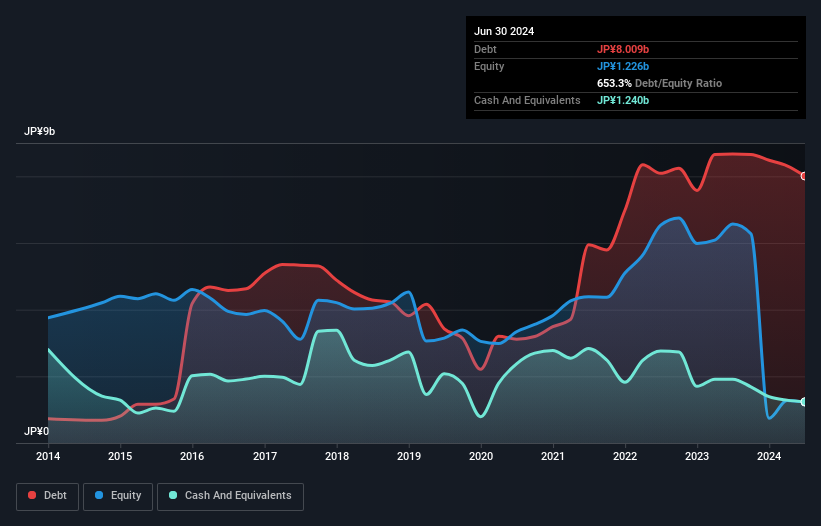Howard Marks put it nicely when he said that, rather than worrying about share price volatility, 'The possibility of permanent loss is the risk I worry about... and every practical investor I know worries about.' When we think about how risky a company is, we always like to look at its use of debt, since debt overload can lead to ruin. Importantly, V-cube, Inc. (TSE:3681) does carry debt. But the more important question is: how much risk is that debt creating?
What Risk Does Debt Bring?
Debt and other liabilities become risky for a business when it cannot easily fulfill those obligations, either with free cash flow or by raising capital at an attractive price. In the worst case scenario, a company can go bankrupt if it cannot pay its creditors. However, a more frequent (but still costly) occurrence is where a company must issue shares at bargain-basement prices, permanently diluting shareholders, just to shore up its balance sheet. Of course, plenty of companies use debt to fund growth, without any negative consequences. The first step when considering a company's debt levels is to consider its cash and debt together.
See our latest analysis for V-cube
How Much Debt Does V-cube Carry?
As you can see below, V-cube had JP¥8.01b of debt at June 2024, down from JP¥8.67b a year prior. However, it also had JP¥1.24b in cash, and so its net debt is JP¥6.77b.

How Healthy Is V-cube's Balance Sheet?
The latest balance sheet data shows that V-cube had liabilities of JP¥7.11b due within a year, and liabilities of JP¥4.07b falling due after that. On the other hand, it had cash of JP¥1.24b and JP¥1.90b worth of receivables due within a year. So its liabilities outweigh the sum of its cash and (near-term) receivables by JP¥8.04b.
When you consider that this deficiency exceeds the company's JP¥6.03b market capitalization, you might well be inclined to review the balance sheet intently. In the scenario where the company had to clean up its balance sheet quickly, it seems likely shareholders would suffer extensive dilution. When analysing debt levels, the balance sheet is the obvious place to start. But it is V-cube's earnings that will influence how the balance sheet holds up in the future. So if you're keen to discover more about its earnings, it might be worth checking out this graph of its long term earnings trend.
In the last year V-cube had a loss before interest and tax, and actually shrunk its revenue by 3.7%, to JP¥11b. That's not what we would hope to see.
Caveat Emptor
Importantly, V-cube had an earnings before interest and tax (EBIT) loss over the last year. To be specific the EBIT loss came in at JP¥44m. When we look at that alongside the significant liabilities, we're not particularly confident about the company. We'd want to see some strong near-term improvements before getting too interested in the stock. Not least because it had negative free cash flow of JP¥1.0b over the last twelve months. That means it's on the risky side of things. When analysing debt levels, the balance sheet is the obvious place to start. But ultimately, every company can contain risks that exist outside of the balance sheet. For example, we've discovered 4 warning signs for V-cube (2 don't sit too well with us!) that you should be aware of before investing here.
If you're interested in investing in businesses that can grow profits without the burden of debt, then check out this free list of growing businesses that have net cash on the balance sheet.
New: Manage All Your Stock Portfolios in One Place
We've created the ultimate portfolio companion for stock investors, and it's free.
• Connect an unlimited number of Portfolios and see your total in one currency
• Be alerted to new Warning Signs or Risks via email or mobile
• Track the Fair Value of your stocks
Have feedback on this article? Concerned about the content? Get in touch with us directly. Alternatively, email editorial-team (at) simplywallst.com.
This article by Simply Wall St is general in nature. We provide commentary based on historical data and analyst forecasts only using an unbiased methodology and our articles are not intended to be financial advice. It does not constitute a recommendation to buy or sell any stock, and does not take account of your objectives, or your financial situation. We aim to bring you long-term focused analysis driven by fundamental data. Note that our analysis may not factor in the latest price-sensitive company announcements or qualitative material. Simply Wall St has no position in any stocks mentioned.
About TSE:3681
V-cube
Engages in the planning, development, offering, operation, and support of visual communication services for enterprise customers in Japan.
Slight risk and slightly overvalued.
Market Insights
Community Narratives



